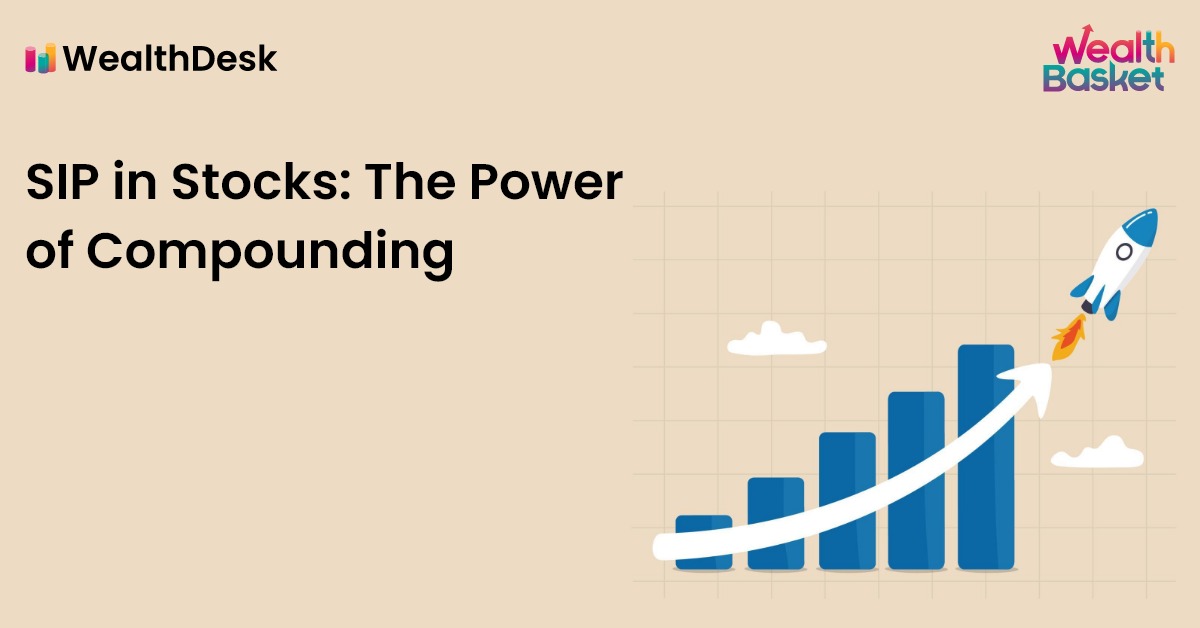Systematic investment plan (SIP) investments offer very high returns in the long run. This is because the compounding effect (or The Eighth Wonder of the World, according to Albert Einstein) plays a crucial role in SIP investment. So, you must be wondering, ‘What is SIP investment?’ Read on.
What is SIP in Mutual Funds?
SIP is a mode of investment in mutual funds. An investor puts in a fixed amount of money at regular intervals (bi-monthly, monthly, quarterly, bi-annually or annually).
The investor decides the fixed amount and the intervals between investments. This is your answer to, ’what is SIP in mutual funds?’
Equity Systematic Investment Plan (E-SIP)
This section will answer the query about how to do SIP in stocks. SIP investment is not restricted to mutual funds only. Instead, it extends to equity investments as well. It is known as E-SIP or DIY-SIP (Do it Yourself SIP), equivalent to SIP mutual fund investment.
The advantage of doing an E-SIP is hedging against volatile stock price movements and reducing average costs. However, timing the market becomes vital in this case, as it directly impacts your returns. The next stage is to be regular and disciplined with investing in the stocks for a decent SIP performance.
SIP Investment Statistics
India is witnessing a historic occasion with unprecedented growth in the number of SIP accounts in mutual funds in SIP investment. As of September this year, 43.2 million active SIP accounts are registered with the Association of Mutual Funds in India (AMFI). The monthly amount of SIP investment India has seen in June this year is Rs.9,155 crores. There is increased traction towards mutual funds via the SIP route in India after the pandemic.
SIP in Mutual Funds vs SIP in Stocks
Now that we have a basic understanding of SIP mutual funds and how to do SIP in stocks, we will shift our focus to ‘Stock SIP vs Mutual Fund SIP’ to have a complete picture of this comparative analysis. Here it goes:
Why is SIP in Mutual Funds a Good Idea?
- Lower Concentration Risk: Even if you do E-SIP, you cannot buy all the listed stocks traded on that exchange. Diversification will be a problem. However, with a mutual fund SIP, your fund manager has chosen a lot of stocks from diverse sectors with negative correlations among them.
- Controlled by Fund Manager: An experienced and professional fund manager will be investing on your behalf in a mutual fund. If you are still wondering what SIP is in mutual funds or how it is beneficial for you, the answer is that you will not have to regularly study and follow the markets in mutual funds. All the research and analysis are done by your fund manager for you.
- Diversification: Diversification in mutual funds is not only across different stocks from different sectors but also across a range of asset classes. For instance, some funds invest in equity, debt, gold, etc. Thus, if equity markets are down 30% in India for a year, your SIP minimum return will not go that low due to this diversification across asset classes.
Why is SIP in Mutual Funds not a Good Idea?
- Costs of SIP Investment: A fund manager investing your money without you having to do any research comes at a cost. These costs are fees associated with SIP mutual funds. They include entry load, exit load, expense ratio, fund, transaction fee, management fee and switch price.
Why is SIP in Stocks a Good Idea?
- Lower Concentration Risk: Even if you do E-SIP, you cannot buy all the listed stocks traded on that exchange. Diversification will be a problem. However, with a SIP mutual fund, your fund manager has chosen a lot of stocks from diverse sectors with negative correlations among them.
- Controlled by Fund Manager: An experienced and professional fund manager will be investing on your behalf in a mutual fund. If you are still wondering what SIP is in mutual funds or how it is beneficial for you, the answer is that you will not have to study and follow the markets in mutual funds regularly. Your fund manager does all the research and analysis for you.
- Diversification: Diversification in mutual funds is not only across different stocks from different sectors but also across a range of asset classes. For instance, some funds invest in equity, debt, gold, etc. Thus, if equity markets are down 30% in India for a year, your SIP minimum return will not go that low due to this diversification across asset classes.
Why is SIP in Stocks not a Good Idea?
- Stock SIP is Riskier: It is riskier since you are on your own in the case of SIP in stocks. You will have to figure out when to offload your stake in a company by liquidating its shares. You will have to figure out the right entry and exit point in a stock. You will have to decide which stocks to buy and which ones to avoid. This is a fundamental difference in stock SIP vs mutual fund SIP.
- Follow Markets Regularly: As a person in charge of his/her portfolio, you will have to regularly track different sectors and companies in which you have invested. You will have to read a lot and follow all the news about your portfolio companies. Learning how to do SIP in stocks the right way might take years.
What are Tax Implications for Stocks and Mutual Funds?
In general, mutual funds and stocks that invest in stocks have similar tax implications. We can observe the tax implications for short-term capital gains and long-term capital gains in the following table.
Tax implications for stocks and equity-oriented mutual funds:
| Type of capital gain | Tax implications |
| Long-term capital gain (LTCG) | 10% above a gain of ₹1,00,000 |
| Short-term capital gain (STCG) | 15% |
A mutual fund that comes with tax benefits is ELSS (Equity Linked Savings Schemes). These are mutual funds that invest in stocks and have a mandatory lock-in period of 3 years. A tax deduction can be claimed on ELSS under Section 80C of the Income Tax Act, 1961.
Difference Between Mutual Funds SIP and Stocks SIP
| SIP in Mutual Funds | SIP in Stocks | |
| Risk | Lower concentration risk due to diversification across sectors. | Higher risk as it is up to the investor to manage diversification. |
| Management | Managed by a professional fund manager. | Managed by the investor, requiring regular market study. |
| Diversification | Diversified across different stocks, sectors, and asset classes. | Limited to the stocks chosen by the investor. |
| Costs | Fees associated with mutual funds include entry load, exit load, expense ratio, transaction fee, management fee, and switch price. | Typically lower costs, no fund management fees. |
| Decision Making | Decisions on which stocks to buy, sell, or hold are made by the fund manager. | The investor needs to decide when to enter or exit a stock. |
| Market Knowledge & Research | Not necessary as it is done by the fund manager. | Essential for choosing and managing stocks. |
| Tax Implications for Long-term Capital Gain (LTCG) | 10% above a gain of ₹1,00,000 | 10% above a gain of ₹1,00,000 |
| Tax Implications for Short-term Capital Gain (STCG) | 15% | 15% |
| Additional Tax Benefits | ELSS mutual funds offer tax deductions under Section 80C. | Generally, no additional tax benefits. |
The Bottom line
If you are a seasoned investor with experience in the market and if you can track the stock market daily, then SIP in stocks is a better bet for you. However, if you are new to the stock market and are still learning about its nuances, start with a SIP mutual fund. And at the same time, learn about how to analyze stock’s fundamentals and when to buy or sell.
Discover stocks that suit certain filter criteria and dive into details to check their WealthBaskets.
With WealthBaskets, retail investors can invest in portfolios from the leading SEBI registered managers in the country at nominal fees. The managers constantly monitor and balance the WealthBaskets against market changes.
FAQs
SIP in stocks means you will invest either a fixed amount every month in the stocks you have chosen or buy the fixed number of shares of the stocks you have chosen.
Stock SIP is riskier as multiple factors are involved here, from timing the market to predict the right entry point in a stock.
SIP investment is a systematic investment plan wherein investors invest a fixed amount of money in a mutual fund scheme or a stock in fixed intervals.
Yes, it teaches you disciplined investing and helps you reduce average costs when the stock prices are falling. The compounding effect is the cherry on the cake here.


















